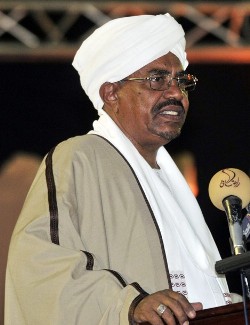Sudan’s Bashir says Juba has little interest in reaching oil deal
January 4, 2012 (KHARTOUM) – The Sudanese president Omer Hassan al-Bashir on Wednesday slammed the Government of Southern Sudan (GoSS) saying they have not been negotiating in good faith on oil issues.

The two countries have been in talks for months with the goal of determining what the fair charge should be for utilizing the oil infrastructure in Sudan.
Bashir said the tactics deployed by GoSS during these negotiations and their responses to the proposals tabled show lack of prospects for a resolution.
He added that the south’s “excellent” situation and flow of oil without payment on the part of GoSS away from any obligations encouraged Juba to be “stubborn” during the talks.
“For that we took the decision unilaterally to take oil transit fees month by month and this is our right,” the Sudanese president said.
In his New Year message South Sudan President Salva Kiir accused Sudan of taking part of his country’s oil without any permission.
Kiir did not offer any details but described this as “looting in a broad day light”.
A source close to GoSS told Sudan Tribune said that Khartoum stole 1.2 million barrels of oil from the pipelines and diverted it to refineries of al-Obeid in North Kordofan and al-Gailey in north Khartoum.
South Sudan may soon take the decision to stop pumping oil, the source added.
Bashir said he is concerned about the threat of South Sudan to stop oil flow but said Juba has more to lose if it took this step than Khartoum because it has no other source of income beside oil. He added that such a decision will also reflect negatively on the oil companies operating in South Sudan.
This week Sudanese government confirmed that it has been confiscating part of the oil pumped by South Sudan to satisfy the dues on transit fees. It is not clear when this measure took effect.
Last month the Sudanese parliament authorized the government to seize crude exports as a form of payment if necessary.
It has yet to be seen how China, which buys most of Sudan’s oil, will react to Bashir’s announcement. The rising world power pressed Khartoum last month to reverse its decision to stop the flow of oil until Juba pays $727 million on oil shipments made through its territory to date.
Less than six months ago South Sudan became the world’s newest country after voting for independence in a January vote, taking with it three-quarters of the country’s oil.
(ST)
